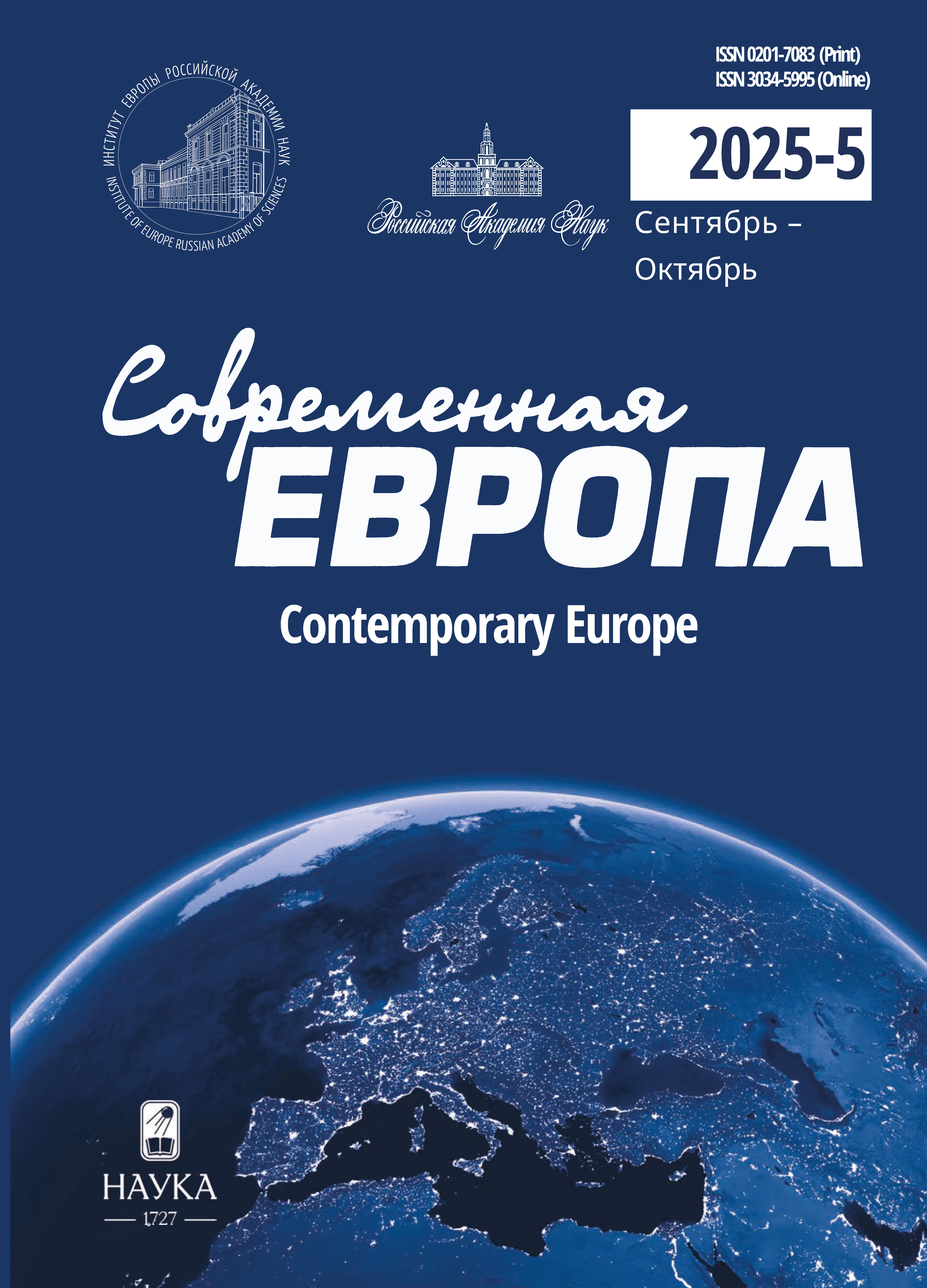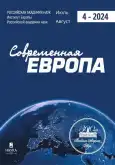No 4 (125) (2024)
EUROPEAN PROCESS: COUNTRIES AND REGIONS
THE ROLE OF TRANSFORMATIVE PROJECTS IN EUROPEAN UNION INTEGRATION DYNAMICS
Abstract
This paper introduces a new approach to understanding the deepening of integration. It examines how and under what conditions the implementation of large projects drives integration dynamics. The study begins by analyzing the demand and supply logic that underlies the explanatory integration theories, primarily two grand theories – neofunctionalism and liberal intergovernmentalism. Both theories agree that the demand for integration is crucial but differ on the nature of interest groups (purely national vs. national and transnational), the levels at which these groups demand integration (only national vs. national and transnational), and the role of supranational institutions. Both theories acknowledge the key role of member state governments at the polity level. Neofunctionalism and institutionalism recognize the role of governments at the level of politics as well, at least when studying significant reforms of specific EU policies. National policymakers are usually ready to deliver the supply of integration (political decisions) when these decisions provide them sufficient compensation for any loss of their autonomy, usually in the form of additional pubic or elite support. What characteristics should a new integration project have in order to accumulate the demand, push politicians to deliver the supply, and be able to trigger the systemic transformation of regional integration organizations like the EU? The study proposes the concept of a transformative project – a type of integration project that can significantly impact integration dynamics and entail systemic changes in governance, polity, and degree of policy coordination. Based on an analysis of the EU’s history, we outline the key characteristics of a transformative project, including complexity to induce a spillover effect, a practice-oriented nature combined with long-term political goals, broad support among stakeholders and society, tangible benefits that impact daily life to promote socialization, a solid groundwork (experience with regulation at the supranational level), and linkage to a global context. The author concludes with several assumptions about the potential of the EU Green Deal as a transformative project.
 5‒16
5‒16


France’s Development Assistance Strategy to African Countries
Abstract
 58-72
58-72


Multilateral Humanitarian Aid As a Foreign Socio-Humanitarian Policy Tool in Britain
Abstract
 45-57
45-57


Artificial Intelligence in the Politics of the EU and China
Abstract
 30-44
30-44


Reform of the Preliminary Ruling Procedure in the EU Court System
Abstract
 17-29
17-29


PROBLEMS OF ECONOMY
World Coal Market: Current State and Long-Term Trends
Abstract
 116-125
116-125


Factors of Foreign Trade Resilience of European Countries in the Context of Global Competition: the Role of Intra-industry Trade
Abstract
 100-115
100-115


Mechanisms of Monetary Cooperation in BRICS: First Results and New Challenges
Abstract
 87-99
87-99


EU as a Trade Power: Adjusting Instruments of Foreign Economic Policy
Abstract
 73-86
73-86


SOCIAL SPHERE
Employed or Self-Employed: the Problem of Regulating Platform Work in the EU
Abstract
 126-139
126-139


EU Social Economy: Means to ending Inequality?
Abstract
 140-150
140-150


The Ecological Dimension of Modern European Culture
Abstract
 151-159
151-159


SOCIETY AND RELIGION
Catholic School as a Model of Interaction Between Church and State in Italy
Abstract
 160-174
160-174


HISTORY AND MODERNITY
RUSSIA/USSR – TÜRKIYE/TURKEY: LEGACY OF “FRIENDLY NEUTRALITY” GOALS OF SOVIET POLICY
Abstract
The article analyzes how the Soviet leadership pursued foreign policy objectives in relation to Turkey and the resulting legacy from these pursuits in today’s terms. USSR-Turkey relations in the 1920s were based on the common political interests of the two states, both of which existed in a similar geopolitical environment. The common goal shared by both nations was to overcome international isolation and ensure national security. The view of the Soviet government on Turkey’s role in border safety matters was outlined by People’s Commissar for Foreign Affairs Georgy Chicherin, who considered USSR‒Turkey cooperation a tool for ensuring security of the southern and southwestern borders of the Soviet Union. The Black Sea Straits were a key issue in bilateral relations. As the Straits were considered a “gateway” for an attack on the USSR’s southern borders, the Soviet government tried to revise the Straits regime in a more favorable way. It was assumed that strong economic ties with the Soviet Union and mutually advantageous cooperation in the security sector would become a robust deterrent instrument for Turkey’s leaders. During the Great Patriotic War, the USSR’s policies towards Turkey were aimed at preventing it from participating in the war on the side of a hostile bloc, as well as revamping the 1936 Montreux Convention more favorably for Soviet leadership. The 1939‒1946 attempts to apply pressure on Turkey regarding the Straits issue caused the latter to withdraw from the orbit of Soviet influence and led to almost two decades of hostility and strained relations between the two nations. After the death of Joseph Stalin, particularly in the Khrushchev era, the Soviet government sought to improve bilateral relations, mainly by identifying common ground in military and political spheres, expanding trade and economic cooperation, and building the foundation for the current high level of bilateral Russia-Turkey relations.
 175-196
175-196


PAGES OF HISTORY
Europe and the End of Shogunate: Japan «Opening»
Abstract
 197-208
197-208


The Fall of the First Republic of Armenia in the Context of Relations with the Entente Countries, USA and Russia
Abstract
 209-219
209-219













